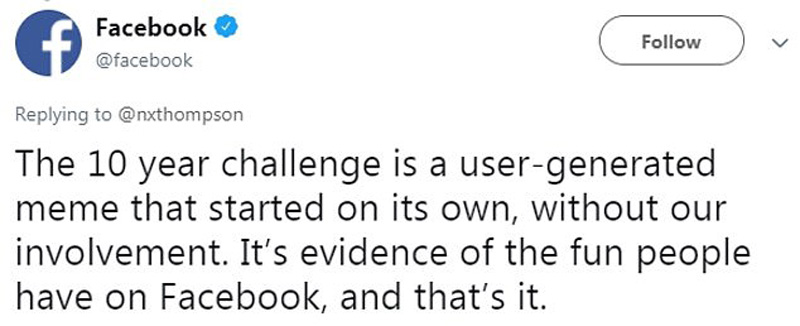So, are you done with liking your friends’ #TenYearChallenge pictures on Facebook, Instagram and Twitter?
Wait, did you post pics of yourself in 2009 and 2019 as well?
Cute, wasn’t it?
Seeing how your friends and loved ones have transitioned over the years. How many of them have, to use the clichés, ‘aged like a fine wine’, ‘look just the same’ or are ‘looking even better’ after a decade!
The latest viral fad to hit various social platforms requires users to share two photos of themselves- one from now and another one from ten years ago.
And since it looks harmless enough, over 5.2 million people from teenagers to executives, environmentalists to grannies and even celebrities dug out old pics and started posting them on their walls!
What seemed like fun did not turn out to be so simple after all, as Kate O’Neill, a writer for Wired, raised a question mark on Facebook’s intentions behind this viral challenge. She pointed out that users had perhaps been tricked into sharing older pictures to help train Facebook’s facial recognition algorithms on age progression and recognition.
Facial Recognition Technology
The much talked about facial recognition is AI (Artifical Intelligence) powered technology works by comparing a real-time image of a person with previous photographs.
Almost 80 nodal points across our face on the eyes, cheeks, mouth and forehead help distinguish one face from another with a fair degree of accuracy, because of which this technology is becoming the most effective way of identifying people. More popular than its predecessor, fingerprinting technology. It has been put to some great use in the recent past.
New Delhi based police were able to track 3,000 missing kids within four days by putting the facial recognition system to use. It is now gaining popularity with law enforcement agencies because of its ability to track down criminals.
A Chinese firm helped a mentally ill man who had been missing for more than a year reunite with his family by linking his photo to public records. Amusement parks have used it to help lost kids reunite with parents.
The technology is also being used by dating site owners and app developers to identify explicit and unwanted content and by retailers to identify shoplifters within the blink of an eye!
Innovative for sure but what about invading the privacy of millions of people who were caught unaware by surveillance cameras?
I, for one, wouldn’t want to be identified at all times and at most places. Why should people be able to identify me because of my pictures shared on social sites by over-enthusiastic friends, even after I have ‘untagged’ myself?
Also, the technology could become a safety hazard if data lands into the hands of hackers or other tracking agencies.
#TenYearChallenge: Facebook Calling Shots?
Let's just imagine that you wanted to, say, train a facial recognition algorithm on age-related characteristics. You'd ideally want a broad and rigorous data set with lots of people's pictures. It'd help if you knew they were taken a fixed number of years apart — say 10 years.
— Kate O'Neill (@kateo) January 13, 2019
Unsuspecting users and diehard fans of the networking site laughed aside O’Neill’s arguments. Since Facebook has been around for almost 15 years already, they said, Zuckerberg’s team had access to their older pictures already.
However, these people living under a rock need to be reminded that users don’t always upload their pics in chronological order. Think about structured data essential for AI to work perfectly. And even if Facebook was to scour user databases to get across to their older pictures, the photo uploading date might not actually be indicative of the time when the picture had been clicked. Getting a large number out of their 2.32 billion monthly active users to share pictures with clear timestamps made the task of curating such a huge database easier for the Facebook team.
A Facebook spokesperson quickly rubbished such allegations and pointed out that the trend was user-generated and that their team had no role to play. The meme, they insisted, had gone viral on its own. It denied any hand in kickstarting the ten-year madness or promoting it.
“Facebook gains nothing from this meme …As a reminder, Facebook users can choose to turn facial recognition on or off at any time,” they clarified.
This is something we users won’t be fooled into believing, now that we know how much the nosey team sitting at the backend likes to snoop upon us. By ‘allowing’ us to tag pictures, Facebook has already been working on facial recognition technology for a long time. So, even if we choose to turn off facial recognition today, our faces still stay on their platform!
“You can delete cookies. You can change browsers. And you can leave your smartphone at home….But you can’t delete your face, and you can’t leave it at home,” points out Alvaro Bedoya, facial recognition expert.
Since most of Facebook’s profit comes from targeted advertising, we have reasons to suspect that Facebook will put their facial recognition technology to use for the same.
And if, god forbid, Facebook decides to sell its technology in future, what happens to our pictures? Facebook is not quite interested in selling its facial recognition tool at the moment but we cannot rule out the possibility of the same happening in future.
This data could also be sold to or shared with, perhaps, insurance agencies who could use the clearly timestamped pictures to compare the rate of ageing between their clients.
“For example, if you seem to be aging faster than your cohorts, perhaps you’re not a very good insurance risk. You may pay more or be denied coverage,” argued O’Neill.
Given that Facebook has improperly shared user data to suit its own ends in the past, this does not sound farfetched. The Cambridge Analytica data privacy scandal is still fresh in public memory!
Takeaways
The #TenYearChallenge might be, at best, Facebook team’s latest attempt to keep its users more actively engaged by taking them down the memory lane. There are no limits for imagining worst-case scenarios because of endless possibilities.
Amazon has already given us a taste of things to come. It had gone on to sell facial recognition technology known as Rekognition to the police departments in Orlando and Washington County, Oregon, for a few dollars every month. It did bear the consequences of the same when grilled by The American Civil Liberties Union but not without giving rise to fears regarding the use, sharing and distribution of this technology.
The technology is definitely doing a commendable job of helping track a handful of criminals by infringing upon the privacy of millions who have not committed any crime!
In the absence of any federal law governing the use of facial recognition technology, questioning the data collected and the motive of a collector (s) is a very genuine concern.
So while there is no harm in having some fun and sharing a little information and/or pictures on social sites from time to time, we need to be wary of apps and memes which encourage us “to participate in specific and particular ways” before jumping on to the bandwagon.
Till the time laws holding companies collecting user data become accountable come into being, we have to be watchful of what and how much we are sharing on public platforms. As has rightly been pointed out by O’Neill, there would be no data and therefore no fear of it being misused unless users choose to share it on their own!
It is difficult to say at present whether or not this viral mania has spread on its own or was fuelled by Zuckerberg’s team but users would do well to remember that there ain’t no such thing as a free lunch in this world.
How are you paying for participating in all these ‘fun’ activities?
Make sure YOU are not being roasted by taking up such challenges!



